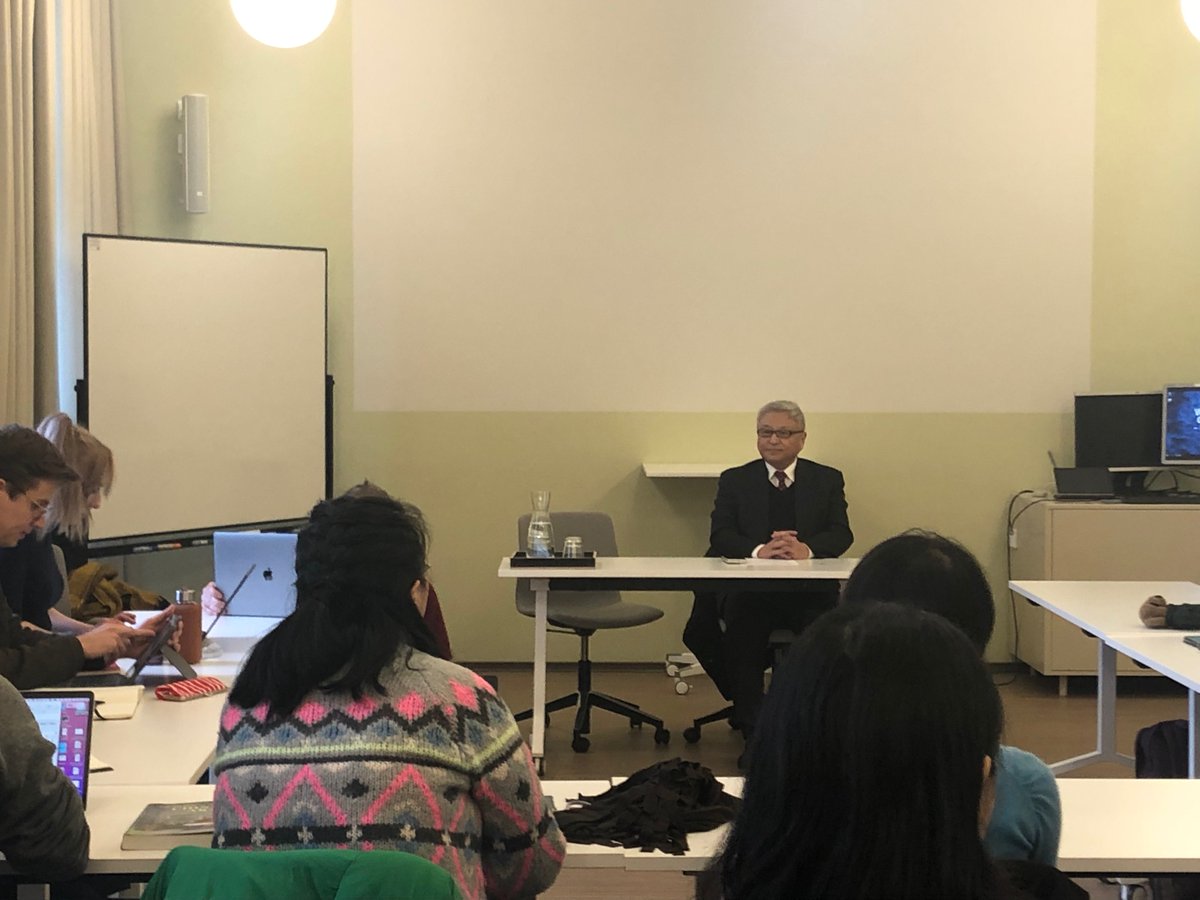
1/ Today, the distinguished professor and dean of the Institute of International Relations at Tsinghua University Yan Xuetong gave a lecture at the University of Helsinki.
Very interesting event, some thoughts below.
THREAD ⤵️
#China #IR #Security
Very interesting event, some thoughts below.
THREAD ⤵️
#China #IR #Security

2/ One day after publishing my own ”Thick Red Book”, the discussion was even more inspiring as there were many overlapping topics, e.g. the role of small states in ”counter-globalization” (in Finnish):
docendo.fi/sivu/tuote/jal…
(The pic is from a @RosebudBooks store).
docendo.fi/sivu/tuote/jal…
(The pic is from a @RosebudBooks store).

3/ The first part was very academic.
Several points:
a) Individuals define national interests while group-thinking accelerates trends
b) Populism, fundamentally xenophobic, is behind ”counter-globalization”
…
Several points:
a) Individuals define national interests while group-thinking accelerates trends
b) Populism, fundamentally xenophobic, is behind ”counter-globalization”
…

4/ …
c) From the Chinese perspective, Trump is right: Beijing benefits from ”globalization” more than the US
d) Thus, Deng Xiaoping’s ideals have not been fully rejected
e) As China is not dogmatically liberal, she did not carry the flag of populism (no counter-reaction).
…
c) From the Chinese perspective, Trump is right: Beijing benefits from ”globalization” more than the US
d) Thus, Deng Xiaoping’s ideals have not been fully rejected
e) As China is not dogmatically liberal, she did not carry the flag of populism (no counter-reaction).
…
5/ …
f) However, ”someone had to get rich first”. Thus, there is maybe even more ground for populist tendencies in China than in the West (a concept Yan rejects).
g) If both great powers, China and the US, have populist leaders, counter-globalization accelerates.
…
f) However, ”someone had to get rich first”. Thus, there is maybe even more ground for populist tendencies in China than in the West (a concept Yan rejects).
g) If both great powers, China and the US, have populist leaders, counter-globalization accelerates.
…
6/ …
h) One can hear a lot of implicit criticism against Xi Jinping.
This is probably a well-considered strategy.
…
h) One can hear a lot of implicit criticism against Xi Jinping.
This is probably a well-considered strategy.
…

7/ I have seen this show before, with Russian intellectuals.
First, they present themselves as relatively liberal and use very academic language. Intellectually stimulating, sophisticated feeling.
Right after that, they reveal a brutally imperialist mindset.
First, they present themselves as relatively liberal and use very academic language. Intellectually stimulating, sophisticated feeling.
Right after that, they reveal a brutally imperialist mindset.

8/ Thanks to @TeivoTeivainen’s provocative question about democracy as well as some discussion about Putin, the distinguished professor revealed himself: there is poverty in the West, too, so our democracy is not better than the ”Chinese democracy”. 

9/ When it comes to Russia, Yan announced that China is just guarding her national interest: Moscow threatens Beijing because of the long border.
However, the distinguished professor ignored a crucial thing: the two countries share a very similar world view.
However, the distinguished professor ignored a crucial thing: the two countries share a very similar world view.
10/ Thus, they are likely to find each other in the future, too. Already now, China and Russia are more or less allied.
If you look for further evidence, just check this out.
npr.org/2022/02/06/107…
If you look for further evidence, just check this out.
npr.org/2022/02/06/107…
12/ However, I am happy such events are being organized.
I would like to know where the distinguished professor will be after ten years.
I would like to know where the distinguished professor will be after ten years.
13/ Some of the Russians I previously referred to have moved abroad, part of them likely feeling regrets about legitimizing imperialist discourses home and abroad.
Some have turned into a full-fledged propaganda machine.
Some have turned into a full-fledged propaganda machine.
14/ In the end, it is surprising how clear-eyed such people can be when staying within their comfort zone.
I largely share Yan’s analysis on (de/counter/anti)globalization.
I largely share Yan’s analysis on (de/counter/anti)globalization.
15/ Let’s hope the West (I do endorse the concept) will succeed better in containing China than it did with Russia. 

• • •
Missing some Tweet in this thread? You can try to
force a refresh









